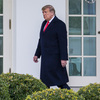Former President Donald Trump is facing charges stemming from an investigation into his efforts to overturn the 2020 presidential election results in Georgia, led by Fulton County District Attorney Fani Willis.
Chandan Khanna/AFP via Getty Images
hide caption
toggle caption
Chandan Khanna/AFP via Getty Images


Former President Donald Trump is facing charges stemming from an investigation into his efforts to overturn the 2020 presidential election results in Georgia, led by Fulton County District Attorney Fani Willis.
Chandan Khanna/AFP via Getty Images
It may be Donald Trump’s fourth criminal indictment in five months, but in a few ways, the charges brought by a Georgia grand jury on Monday are some of the heftiest he’s facing.
Legally, they may be trickier for the former president to wiggle out of, and politically, they pose fresh narrative challenges, even for a candidate who has a solid grip on the GOP primary race.
Here are three reasons you should expect to hear a lot about this case during the presidential election season:
1. The scope is huge
Trump has been charged alongside 18 other defendants ranging from his high-profile allies — like his former attorney Rudy Giuliani and former White House chief of staff Mark Meadows — to Trevian Kutti, a former publicist who pressured an election worker to falsely admit to committing election fraud.
Prosecutors say all of these defendants conspired toward the same goal: keeping Trump in office.
And they were all charged under a state racketeering law, RICO, which loops Trump into a criminal enterprise category reserved for mafia bosses and gang leaders.
This is not a case of one person allegedly trying (and failing) to overturn an election; prosecutors are saying Trump used his influence to organize a network of false claims and potentially illegal action.
Unlike the previous federal indictments, the use of RICO for this charge may send a chilling message to anyone even thinking of assisting Trump in spreading future election fraud claims: You, too, could be legally liable.
2. These are state charges
As the news of these charges was spreading on Tuesday, one of Trump’s GOP primary rivals broke with a pattern he’s stuck to for the previous three indictments.
Instead of using the moment to take a full swipe at Trump, former New Jersey Gov. Chris Christie said he thought the indictment was “unnecessary” because Trump has already been indicted on the federal level for his efforts to overturn the election.
But that narrative, even for a Trump rival, may be a tough sell: State charges and federal charges are just not the same.
That’s true for both the potential consequences Trump faces (a president cannot pardon himself from state charges, for example) — and for the narrative he could offer.
In the U.S., the states administer all elections, including the vote for president. And in Georgia, it was a slate of Republican office holders — from Gov. Brian Kemp to Secretary of State Brad Raffensperger — who pushed back against his election fraud claims.
You can expect Trump to still claim the state’s politicians are biased against him, but it’ll be a bit harder for him to pin that on his favorite scapegoat: the Democratic Party.
3. There’s compelling evidence the public can see and hear
Much of the evidence cited in this case was first shared by the media months or even years ago.
There is video of Trump loyalists falsely trying to convince Georgia lawmakers they have the right to choose the state’s presidential victor. There are fake documents from Republicans claiming to be presidential electors.
And, of course, there’s the phone call in which Trump begs Raffensberger to “find” the 11,780 votes he’d need to win.
If anything will move the needle in the court of public opinion, it could be this sort of straightforward, accessible evidence. Sound bites are easier to digest than novel-length, jargon-dense indictments, even if they are starting to pile up.
This story originally appeared in our digital live coverage.
This story originally appeared on NPR






